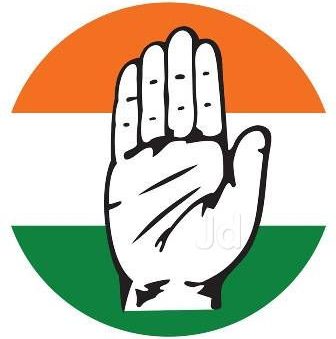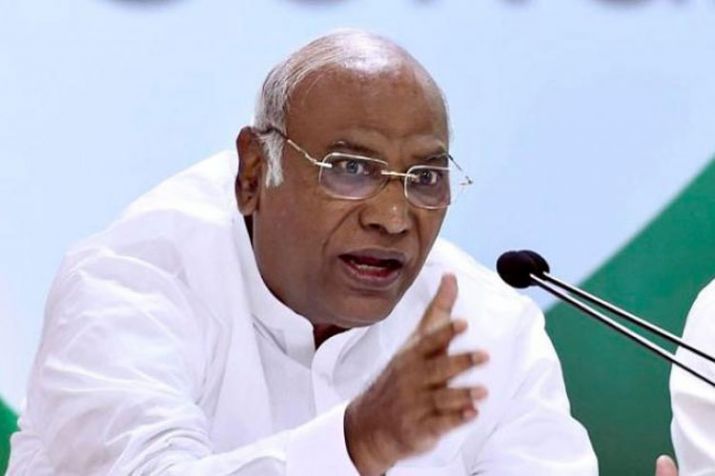Mallikarjun Kharge
Mallikarjun Kharge was born in the Warwatti, Bhalki Taluk, Bidar District, Karnataka to Mapanna Kharge and Sabavva. He finished his schooling from Nutan Vidyalaya in Gulbarga and went on to obtain a Bachelor of Arts degree from the Government College, Gulbarga and his Law degree from the Seth Shankarlal Lahoti Law College in Gulbarga. He started his legal practice as a junior in Justice Shivraj Patil’s office and fought cases for labour unions early in his legal career.
Kharge started his political career as a student union leader while in the Government College, Gulbarga when he was elected as the General Secretary of the students’ body. In 1969, he became the legal advisor to the MSK Mills Employees’ Union. He was also an influential labour union leader of Samyukta Majdoor Sangha and led many agitations fighting for the rights of labourers. In 1969, he joined the Indian National Congress and became President of the Gulbarga City Congress Committee.
He first contested for the Karnataka State Assembly elections in 1972 and won from Gurmitkal constituency. In 1973, he was appointed as the Chairman of the Octroi Abolition Committee which went into the question of revitalising the economy of the municipal and civic bodies in the state of Karnataka. In 1974, he was appointed as the Chairman of state-owned Leather Development Corporation and worked to improve the living conditions of thousands of cobblers who were indulging in the leather tanning industry. Work sheds cum residences were built across the state for their benefit during this time. In 1976, he was appointed as the Minister of State for Primary Education, during which time, over 16,000 backlog vacancies of SC/STs teachers were filled up by recruiting them directly into the service. Grants under grant-in-aid code were given to schools run by SC/ST managements for the first time.
In 1978, he was elected for the second time as MLA from Gurmitkal constituency and was appointed as Minister of State for Rural Development and Panchayat Raj in the Devaraj Urs ministry. In 1980, he became the Minister for Revenue in the Gundu Rao Cabinet. During this time, the focus was on effective land reforms, resulting in giving occupancy rights to millions of land-less tillers and labourers. More than 400 land tribunals were constituted to expedite the transfer of land rights to the tillers. In 1983, he was elected for the third time to the Karnataka Assembly from Gurmitkal. In 1985, he was elected for the fourth time to the Karnataka Assembly from Gurmitkal and was appointed as the Deputy Leader of the Opposition in the Karnataka Assembly.
In 1989, he was elected for the fifth time to the Karnataka Assembly from Gurmitkal. In 1990, he joined Bangarappa’s Cabinet as the Minister for Revenue, Rural Development and Panchayat Raj, portfolios he had held earlier and brought about significant change. Restarting the Land Reforms process that had stopped in the interim, resulted in hundreds of thousands of acres of land being registered in the name of the landless tillers.
Between 1992 and 1994, he was the Minister for Co-operation, Medium and Large Industries in the Veerappa Moily Cabinet. In 1994, he was elected for the sixth time to the Karnataka Assembly from Gurmitkal and became the Leader of the Opposition in the Assembly. In 1999, he was elected for the seventh time to the Karnataka Assembly and was a front-runner to the post of Chief Minister of Karnataka. He became Minister for Home in the S. M. Krishna Cabinet during a particularly trying time for Karnataka especially the Rajkumar kidnap by the notorious poacher Veerappan and the Cauvery Riots. In 2004, he was elected for the eighth consecutive time to the Karnataka Assembly and was once again considered a front-runner to the post of the Chief Minister of Karnataka. He became the Minister for Transport and Water Resources in the Dharam Singh-led coalition government.
In 2005, he was appointed as the President of the Karnataka Pradesh Congress Committee. In the Panchayat elections held soon after, Congress won the largest number of seats compared to BJP and JD(S) indicating a revival of the Congress fortunes in the rural areas of Karnataka. In 2008, he was elected for the record ninth consecutive time to the Assembly from Chitapur. Though the Congress party put up a better show when compared to the 2004 elections, the Congress lost the elections with a majority of the senior leaders losing. He was appointed as the Leader of the Opposition for the second time in 2008. In 2009, Kharge contested the general elections from Gulbarga Parliamentary Constituency and won his tenth consecutive election.
In the 2014 general elections, Kharge contested and won from the Gulbarga parliamentary seat, beating his closest rival from the BJP by over 73,000 votes. In June, he was appointed as the Leader of the Congress party in the Lok Sabha.
He is the Founder-Chairman of Siddharth Vihar Trust that has built the Buddha Vihar in Gulbarga, India.
He is the Patron of Chowdiah Memorial Hall which is one of the premier concert and theatre venues in Bangalore and helped the centre get over its debts and aided the centre’s plans for renovation.
[Source : Wikipedia]

